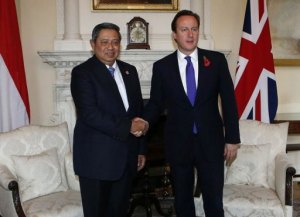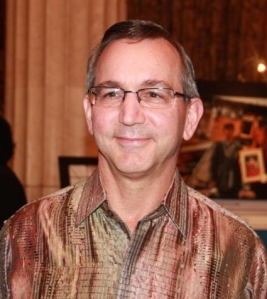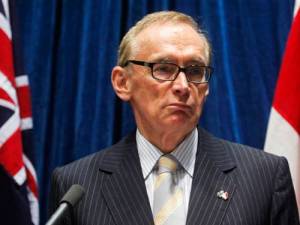Indonesia sets up special police team guard US’ mining site in Papua
A senior police officer overseeing Indonesia’s Papua province said on Wednesday that they will set up a special police team to safeguard the US’ Freeport gold and copper mining site in the province due to frequent violence by separatist group Free Papua Organization (OPM) aiming Freeport’s workers.
Chief of the Papua police, Inspector General Tito Karnavian said there have been cases of shooting and murder in Freeport operation area conducted by OPM’s armed groups.
“The team has to deal with many such cases and probe them thoroughly to the very bottom,” Karnavian said in Mimika, Papua.
Hundreds of acts of terror by OPM’s armed groups left more than 20 people killed including Freeport workers, police officers, company’s security officers and local traditional gold prospectors, he added.
He said that security condition around the mining site is under control. Investigations into violence cases occurring in Karnavian ‘s jurisdiction are underway at the moment with trials against perpetrators are progressing.
Karnavian visited the Freeport workers’ compound in Tembagapura, Mimika, last week.
SourceL Global Times
The US Ambassador inquires about security situation in Papua
United States ambassador Scot Marciel sought information about the security situation in Papua during a visit to the regional military command headquarters here on Monday, according to command spokesman Lt Col Jansen Simanjuntak.
“During his recent visit to the Cenderawasih military regional command headquarters, Mr Marciel asked the command`s chief of staff, Brigadier General I Made Agra Sudiantara, about the security situation in Papua,” Lt Col Jansen stated.
In response, Brig. Gen. I Mada Agra Sudiantara said the situation in Papua was “peaceful” and security problems were handled by the police, with the military ready to assist upon request – in line with Law No. 34/2004 on TNI (military).
“The law is implemented using `soft power` through territorial supervision, while efforts are being made to accelerate economic development, including improving human resources, in the inland regions so Papua can catch up with other provinces,” he explained.
“The command`s chief of staff stated that the presence of TNI forces in Papua is in line with the legal mandate, while maintaining security is the job of the police,” Brig. Gen. Sudiantara said.
During his short visit, Marciel also expressed the US government`s support for Indonesia as a sovereign country.
“The US government is also proud of the current developments in the country, especially the changes that have happened in the TNI over the past 15 years,” Brig. Gen. Sudiantara pointed out.
“He also called for increased cooperation between the two countries in education, culture and military,” he added.
Source: ANTARA News
U.S. Ambassador Scot Marciel Visits Papua
Ambassador Marciel’s visit to Papua highlights the United States’ commitment to working across Indonesia to support increased cooperation under the U.S.-Indonesia Comprehensive Partnership. The United States sees Papua as an integral part of Indonesia and supports progress toward increased economic opportunity and development of local political and civil institutions.
During the visit, the Ambassador will highlight new and existing U.S. Agency for International Development (USAID) programs that support growth and development for the people of Papua. These programs expand on the U.S. government’s continuing commitment to support development in the region.
Ambassador Marciel met with the Head of Department of Education, Youth and Sport Affairs for Papua, Dr. James Modouw, to discuss the roll out of a new education curriculum for more than 32,000 students in 355 schools across 6 districts.
“A Papua specific curriculum will help inspire Papuan children to learn and will also reflect the profound respect we have for Papua’s rich culture,” said Ambassador Marciel.
The $2.8 million grant from the United States will help the provincial Department of Education to refine, print and distribute the new curriculum, as well as conduct training for teachers.
Under the USAID SERASI program, USAID partners with Yayasan Kristen Wamena Teacher Training Institute to develop curricula in Math and Bahasa Indonesia for first and second graders that are adapted to local culture and meet or surpass national standards.
The Provincial Government of Papua will use the Papua-specific curriculum in remote areas, particularly the broader highland area. Five highland districts and other organizations that work in non-formal or parallel education system will adopt the curriculum.
During his meetings in Papua Ambassador Marciel also discussed other U.S. assistance initiatives in health, environment, economic development, and governance.
The United States is providing $1.5 million in support through a new USAID program that will reduce deforestation, preserve biodiversity, and increase income for Papuans by promoting sustainable management of the Cyclops mountain range.
Ambassador Marciel said, “The United States is proud to partner with the Papua Provincial Government Low Carbon Development Taskforce and local governments and communities to reduce deforestation in the Cyclops mountain range and preserve it for future generations.”
The USAID program will partner with local governments, businesses, and communities to promote renewable biomass energy as an alternative to cutting down trees to be converted to charcoal. The program will be including plant trees and rehabilitate areas that are essential to the health of the Cyclops mountain range and provide water supply for the city of Jayapura.
In addition, the program will convene forums in local communities to educate citizens, local governments, the private sector, and NGOs on strategies to improve the management of natural resources.
The USAID program in the Cyclops Mountains will help Papua fulfill its commitment and contribute to REDD+, a global initiative to reduce emissions from deforestation and forest degradation.
USAID is also working with local governments in Papua to finalize a new health governance program to support improvements in the quality of public health service in several districts.
The program plans to target improving service delivery in the areas of maternal and child health, HIV/AIDS and Tuberculosis. This initiative will utilize the lessons from successful USAID efforts in other Indonesian provinces that have improved the quality, effectiveness, and reliability of public services.
Source: Tempointeraktif
Australian won’t bow to Papua pressure, FM says
Foreign Minister Bob Carr says Australia has been “explicit” in its support for Indonesia’s sovereignty over Papua.
(See the video)
“There are Australians, a very small number I think…who take an interest in the notion for more autonomy for Papua but I remind them that you’d be doing a disservice to the Indonesian population of those two provinces if you held out any hope that Australia could influence the cause of events,” he said.
The Foreign Minister has dismissed suggestions public pressure would cause Australia to change its policy on Papua’s autonomy.
“I just ask those idealistic Australians who might entertain some other arrangement, that what would be the cost in terms of our friendship with Indonesia and in terms of our budget of a different arrangement.
“It’s inconceivable, utterly inconceivable.”
‘Australians seen as Asians’
The Foreign Minister says Australia’s relationship with Indonesia involves a “habit of consultation” – a relationship it enjoys with a number of its Asian neighbours including Japan, South Korea and Singapore.
“We had the Singaporeans through in recent weeks and again we have common approaches to issues like the South China Sea, he said.
“A comfortable alignment of our foreign policy positions.”
He also countered criticisms Australia’s perceptions of Asia are superficial and too “Eurocentric” in response to the recently-released Asian Century policy paper.
“The foreign minister of Myanmar was through here last week and he said..’We see Australia as Asians’,” he said.
“Why wouldn’t he? We were there in Myanmar lifting, not just suspending our sanctions.”
Senator Carr says the fact Australia won a seat on the United Nations Security Council is also testament of its strong relationship with its neighbours.
“I was struck by this when I stood there in the UN and I was being congratulated by nations from every region in the world and it dawned on me that they’re comfortable with Australia and that reflects our diplomacy,” he said.
Source: Australia Network News
Indonesia and Britain sign defense agreement
Indonesia’s Defense Minister Purnomo Yusgiantoro and his British counterpart Philip Hammond have signed a memorandum of understanding on defense.
The ceremony taking place at the Downing Street no 10, London, on Thursday was witnessed by Prime Minister David Cameron and President Susilo Bambang Yudhoyono.
A release issued after the ceremony said the MoU serves as an umbrella for the promotion of defense cooperation between the two countries.
“The memo of understanding is a signal of the spirit of both side to expand cooperation between Britain and Indonesia in the future,” the statement said.
Cooperation between Indonesia and Britain began in 1997 when the two countries pledged to create a closer cooperation.
The visit to Indonesia of Prime Minister Tony Blair in 2006 strengthened the cooperation.
In 2007, Britain placed Indonesia in top priority in its foreign policy especially in defense cooperation with ASEAN.
Source: ANTARA News
Britain and Indonesia ink deals on trade, defence, education

Britain’s Prime Minister David Cameron shakes hands with Indonesian President Susilo Bambang Yudhoyono
“They had constructive discussions on a number of subjects, with the focus on the UK-Indonesian trade and investment relationship,” said a spokeswoman for Cameron’s Downing Street office.
On the second day of Yudhoyono’s state visit to Britain, aimed at boosting ties with the emerging Asian power, the two leaders and Liberia’s President Ellen Johnson Sirleaf also chaired talks in London on global efforts to fight poverty.
The Downing Street spokeswoman said Cameron and Yudhoyono had sealed a defence deal which would boost cooperation in “research and development, investment and production”.
They also announced a £7.5 billion ($12.1 billion, 9.3 billion-euro) deal for BP to develop liquid natural gas in Indonesia, and signed an agreement strengthening links between the two countries’ universities.
Cameron’s spokeswoman added that while he had praised Yudhoyono for “his leading role in Indonesia’s transition from autocracy to a vibrant democracy”, the pair had discussed the protection of human rights in regions such as Papua.
The two leaders and Johnson Sirleaf had earlier chaired a panel of politicians from 26 countries charged with developing an anti-poverty strategy after the Millennium Development Goals expire in 2015.
The eight goals, established in 2000, set targets on improving education, health and women’s rights, ending hunger, and protecting the environment.
Cameron said he believed world leaders now had a real opportunity to eradicate poverty.
“That is something politicians have been talking about for a while — but for the first time I believe this generation really has the opportunity to do it,” he said after the meeting.
“We think the Millennium Development Goals have made great progress. There’s more progress to be made between now and 2015, but we’re clear the next stage should be aiming to eradicate absolute poverty in our world completely.”
The panel is meeting for three days in London, the second of four rounds of talks before it reports back to UN Secretary General in May next year.
On Friday, the final day of Yudhoyono’s state visit, he will address officials at the Foreign Office and meet with Indonesian business figures.
Queen Elizabeth II hosted a glittering banquet in honour of Yudhoyono and his wife Ani on Wednesday night, after formally welcoming them with a guard of honour and a ride in her ceremonial carriage.
Source: AFP




